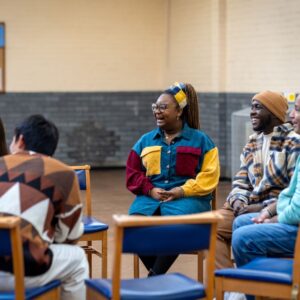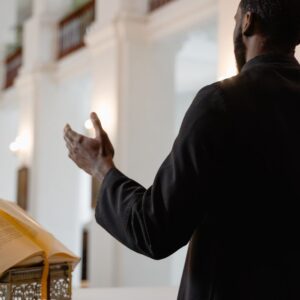Crucible Moments
There are times in our leadership when things can feel unbearably heavy or overwhelming—your body tenses, stress hormones flood your system, your mind races, and you feel pulled in all directions.
For some, this distress sparks a compulsion to act immediately, fighting through the perceived challenges with a fear-fueled, angry response. For others, the overwhelming reaction from this fear is to retreat into a protective cave, or flee into distraction to escape the pressure. Still others might feel frozen, unable to move forward, caught within a web of internal uncertainty and external chaos.
In truth, during these crucible moments, we often experience all of these impulses as we search to regain our footing and orientation. These moments are opportunities for continuous learning–growth that comes not just from learning how to solve a problem and find the right answer, but from intrapersonal growth.
I can still vividly remember one of those moments. I was entering my first year as Dean of Academics, thinking about the kind of leader I wanted to be, how I would guide the faculty toward shared goals, and how I would earn their trust. In my first trimester, however, a student’s behavior became unsettling to his peers and a faculty member. He was making veiled threats and expressing aggressive fantasies toward women.
It was clear that our school’s environment—a place encouraging self-exploration—was not the right fit for him, as he needed help containing his inner turmoil. The President was away on a three-week fundraising trip, and I found myself, for the first time, bearing the full weight of responsibility. The faculty turned to me for guidance, and the pressure to act was intense.
Inside, I felt paralyzed, my mind clouded with fear and doubt. Is this what I signed up for? At the time, I didn’t realize I was experiencing a threat response—my body and emotions were overwhelmed, caught between internal shame and external pressure. It was a crucible moment.
Since that experience, I have faced other overwhelming moments in leadership, but I learned something crucial in this first crucible. These moments weren’t just about crisis management; they were opportunities to learn about my reactions—to recognize emotional flooding, calm my body and mind, and ask for help.
Continuous Learning
This learning wasn’t about command-and-control leadership or change management techniques. It was about my resilience and adaptability. The focus shifted from what I do to who I am, and who I am becoming as a leader.
Continuous Learning Shifts Your Focus from “What I Do” to “Who I Am”
This kind of learning requires shifting our focus from the external chaos to the inner work of confronting our fears and doubts. Warren Bennis and Robert Thomas describe this as crucible learning—those pivotal moments that compel us to lean into uncertainty and discomfort, to face the parts of ourselves we’d prefer to avoid. It is a reflective process, not a reactive one, and it only becomes possible when we quiet the shame-filled narratives that keep us locked in rigid cycles of self-condemnation.
By interrupting these cycles with new thoughts and reshaping our internal story, we shift from simply managing external problems to fostering internal growth. In this space, we become more attuned to our inner world, unlocking new depths of meaning and purpose.
Continuous Learning is Embodied
Of course, when you’re emotionally overwhelmed, it’s hard to believe that growth is possible. This type of learning requires intentionality both before a situation arises and during the moment of distress. It involves cultivating a growth mindset, as Carol Dweck describes, which allows us to see difficult experiences as opportunities for learning.
I’ve found that the ability to learn in the immediate situation cannot happen unless I first manage my body’s physiological response, as this is the first critical element to continuous learning. I must pause and take a breath, and find a way to ask myself, “What is frightening you right now?” Without this question, I have little curiosity to offer when I’m in fight/flight/freeze mode. In the situation with the student, I eventually had to confront within myself what frightened me about the situation—the potential for violence and the fear of failing my colleagues—and bring my body out of a threat posture.
What ultimately helped me settle down was the co-regulation of trusted colleagues, those who stood with me in the struggle. Their presence allowed me to calm down, and as my sense of threat subsided, I became more open to what the situation was teaching me.
Continuous Learning Happens in Community
This brings me to highlight a second critical element of continuous learning: the importance of not navigating these experiences in isolation. It’s tempting, especially in moments of intense pressure, to withdraw and carry the burden of leadership alone. However, the support of others is not just helpful—it’s essential.
For many, particularly those whose early experiences lacked emotional support or security, leaning on others can feel uncomfortable, or even threatening. Yet, cultivating a strong support system is vital for moving through crucible moments. This need for connection is often overlooked, as leadership is frequently portrayed through narratives of solitary, heroic figures who succeed by sheer will or individual strength.
Continuous Learning Broadens Your Perspective
Once we have begun to calm our nervous system and seek support from others, another crucial step in continuous learning is developing the ability to hold multiple perspectives and tolerate ambiguity.
In moments of crisis, it’s easy to get caught in narrow, reactive thinking—fixated on the immediate problem, overwhelmed by fear, or constrained by rigid patterns of thought.
Growth requires us to step back and open ourselves to a wider view, one that allows for complexity and uncertainty. It asks us to move beyond binary thinking and into a space where paradox and deeper meaning can emerge.
This process of widening our perspective, while challenging, is essential for cultivating the reflective learning that turns a crucible moment into an opportunity for growth. This is where the work of thinkers like Iain McGilchrist and Esther Lightcap Meek becomes particularly relevant.
Iain McGilchrist’s exploration of the divided brain emphasizes that how we perceive and respond to the world shapes our reality. He explains that the right hemisphere of the brain is attuned to seeing the whole picture, holding ambiguity, and staying open to new perspectives. During my crisis, learning to stay open—to resist that left-hemisphere impulse of rushing to judgment or retreating into fixed ideas—was crucial. I had to hold the tensions and wait for my perspective to shift, to see beyond the immediate threat and engage with deeper questions about my role as a leader.
Esther Lightcap Meek’s philosophy also resonates here. She speaks of true knowing as a relational act, requiring us to hold the particulars of a situation within a broader understanding. In facing the abyss of leadership crises, we often become overwhelmed by immediate fears and uncertainties. But these moments invite us to look deeper, to see the larger picture unfolding even when it’s obscured by the chaos of the present. Meek suggests that such experiences, though unsettling, can deepen our capacity for trust and help us learn from what we cannot fully control or understand.
Continuous Learning Leads to Wisdom
Continuous learning, I discovered, is not just about accumulating knowledge—it’s about creating space for spiritual wisdom, the kind of wisdom that emerges when we release our grip on preconceived ideas and open ourselves to new understanding.
This spiritual learning invites us to listen more deeply to the movements within our own soul, discerning what holds true value in the transient circumstances of life. It requires humility, a willingness to be transformed by the very challenges that unsettle us. This type of learning often feels countercultural because it doesn’t fit neatly into society’s metrics of success or achievement. Yet, it is infinitely valuable, guiding us toward a deeper, more holistic understanding of ourselves, others, the world, and the divine. It calls us to grow not just in knowledge, but in wisdom, compassion, and inner strength.
Leadership: A Journey of Growth
This journey is a pilgrimage—a path shaped by long-suffering, discomfort, and uncertainty. As Jesus taught, we must die to our old selves to find true life, shedding the identities we once clung to in order to embrace the vulnerability that leads to genuine transformation.
Howard Thurman’s reflections on the resilience of the human spirit and his resistance to despair offer profound insights into this kind of learning. In Jesus and the Disinherited, he wrote about the struggles of marginalized communities, where hopelessness often threatens to take hold. Yet, Thurman believed that even in the darkest times, there is a ‘sound of the genuine’ within each person—an inner voice that connects us to our true purpose and the divine presence that offers hope. This belief provides a powerful foundation for resisting despair, reminding us that, even in struggle, there is meaning, and even in grief, there is hope.
If you’re feeling stretched or unsure right now, I invite you to pause, reflect, and listen to what this moment might be teaching you. It’s not necessarily a sign of failure or a dead end—it might just be the unfolding path of your leadership, an invitation to shift.
Whether you are guiding a ministry, a non-profit, or any organization where the stakes are deeply personal, there will be times when the way forward seems unclear, and you begin to question whether your past experiences or methods are enough. But you don’t have to have all the answers.
Leadership is a journey of growth—not just in what we know, but in who we are becoming. Through the process of continuous learning, we come to see that every challenge holds within it the potential for deeper wisdom, greater strength, and more meaningful leadership.
Resources that influenced our perspective on continuous learning
Bennis, Warren G., and Thomas, Robert J. Geeks and Geezers: How Era, Values, and Defining Moments Shape Leaders. Harvard Business Review Press, 2002.
Dweck, Carol S. Mindset: The New Psychology of Success. Random House, 2006.
Lightcap Meek, Esther. Longing to Know: The Philosophy of Knowledge for Ordinary People. Brazos Press, 2003.
McGilchrist, Iain. The Master and His Emissary: The Divided Brain and the Making of the Western World. Yale University Press, 2009.
Thomas, Robert J. Crucibles of Leadership. Harvard Business Review Press, 2008.
Thurman, Howard. Jesus and the Disinherited. Abingdon Press, 1949.










0 Comments